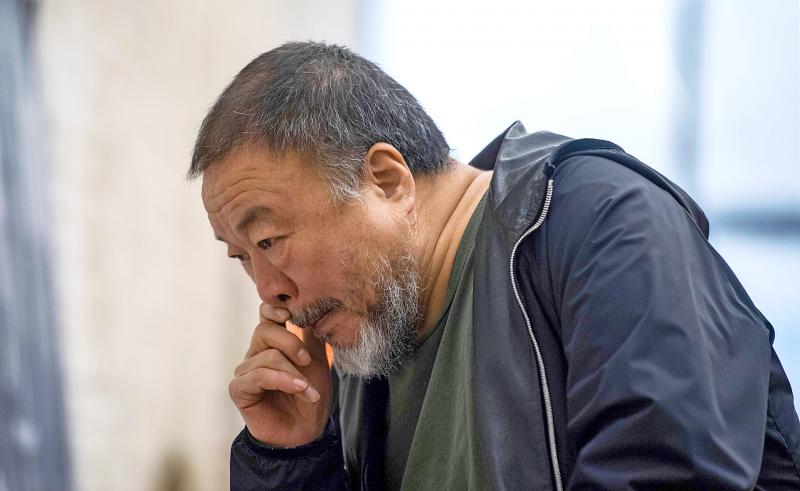Art has come together with activism in the shape of face masks created by Ai Weiwei (艾未未) which show images of sunflower seeds, mythical beasts and perhaps most appropriately of all, a defiant middle finger.
The Chinese artist and activist has printed an initial batch of 10,000 face masks to be sold for charity through eBay. All the takings will go to coronavirus humanitarian efforts led by Human Rights Watch , Refugees International and Medecins Sans Frontiers .
Ai was at home in Cambridge when he began getting angry about face mask news stories including the US being accused of “modern piracy,” accused of taking masks meant for Germany.

Photo: AFP
It was almost laughable, he said.
“It is such a waste. There is so much argument around the mask. A face mask weighs only three grams but it carries so much state argument about global safety and who has it and who doesn’t have it.”
He printed a wood carving on to a mask and put it on Instagram. People loved it and asked how they could get hold of one. From that came his new art project.
The art works will be sold singly for US$50, US$300 for a series of four and US$1,500 for a collection of 20. They will have images familiar to fans of the artist’s work, including sunflower seeds based on his Tate Modern installation in which he filled the gallery’s Turbine Hall with 100 million individually crafted sunflower seeds. Some of the images will include his middle finger gesture of defiance.
Ai said the pandemic was a humanitarian crisis.
“It challenges our understanding of the 21st century and warns of dangers ahead. It requires each individual to act, both alone and collectively.”
He likened each purchase to an act of hope and social awareness.
The images have been silk-screened by hand in Berlin on to non-surgical cloth face masks. Ai predicts people will buy them to collect rather than wear.
Ai spent 81 days in a Chinese jail and four years under house arrest before getting his passport back and fleeing to Germany in 2015. He moved to the UK last year.
He said people were right to feel anger towards China over the pandemic.
“When we talk about humanity the most important thing is trust, between people and between nations. Without transparency and trust you cannot play the game. China has been for a long time not trustable. We have all accepted that.”
China had intentionally covered up information about the outbreak, even destroying medical evidence, he said.
“China has been acting in the old military way: everyone who questions them can be a potential enemy.”
The project is curated by Alexandra Munroe, who said the masks were artworks which symbolized life in the time of coronavirus.
“To have one is an ethical and creative act to overcome our tired isolation and participate in a collective enterprise of real compassion.”
Ai was preparing direction of an opera, Puccini’s Turandot, when the lockdown came during rehearsals.
At home in Cambridge, where he lives with his partner and child, it was wonderful, he said.
“I have never had such a peaceful and enjoyable time in my life. I’m spending so much time with my loved ones and this spring in Cambridge will be memorable for the rest of my life because I’ve never seen so many wildflowers. Daily I walk out in the fields and take photographs and see what their Latin and Chinese name is. It is so much fun.”

Exceptions to the rule are sometimes revealing. For a brief few years, there was an emerging ideological split between the Democratic Progressive Party (DPP) and Chinese Nationalist Party (KMT) that appeared to be pushing the DPP in a direction that would be considered more liberal, and the KMT more conservative. In the previous column, “The KMT-DPP’s bureaucrat-led developmental state” (Dec. 11, page 12), we examined how Taiwan’s democratic system developed, and how both the two main parties largely accepted a similar consensus on how Taiwan should be run domestically and did not split along the left-right lines more familiar in

As I finally slid into the warm embrace of the hot, clifftop pool, it was a serene moment of reflection. The sound of the river reflected off the cave walls, the white of our camping lights reflected off the dark, shimmering surface of the water, and I reflected on how fortunate I was to be here. After all, the beautiful walk through narrow canyons that had brought us here had been inaccessible for five years — and will be again soon. The day had started at the Huisun Forest Area (惠蓀林場), at the end of Nantou County Route 80, north and east

Specialty sandwiches loaded with the contents of an entire charcuterie board, overflowing with sauces, creams and all manner of creative add-ons, is perhaps one of the biggest global food trends of this year. From London to New York, lines form down the block for mortadella, burrata, pistachio and more stuffed between slices of fresh sourdough, rye or focaccia. To try the trend in Taipei, Munchies Mafia is for sure the spot — could this be the best sandwich in town? Carlos from Spain and Sergio from Mexico opened this spot just seven months ago. The two met working in the

This month the government ordered a one-year block of Xiaohongshu (小紅書) or Rednote, a Chinese social media platform with more than 3 million users in Taiwan. The government pointed to widespread fraud activity on the platform, along with cybersecurity failures. Officials said that they had reached out to the company and asked it to change. However, they received no response. The pro-China parties, the Chinese Nationalist Party (KMT) and Taiwan People’s Party (TPP), immediately swung into action, denouncing the ban as an attack on free speech. This “free speech” claim was then echoed by the People’s Republic of China (PRC),